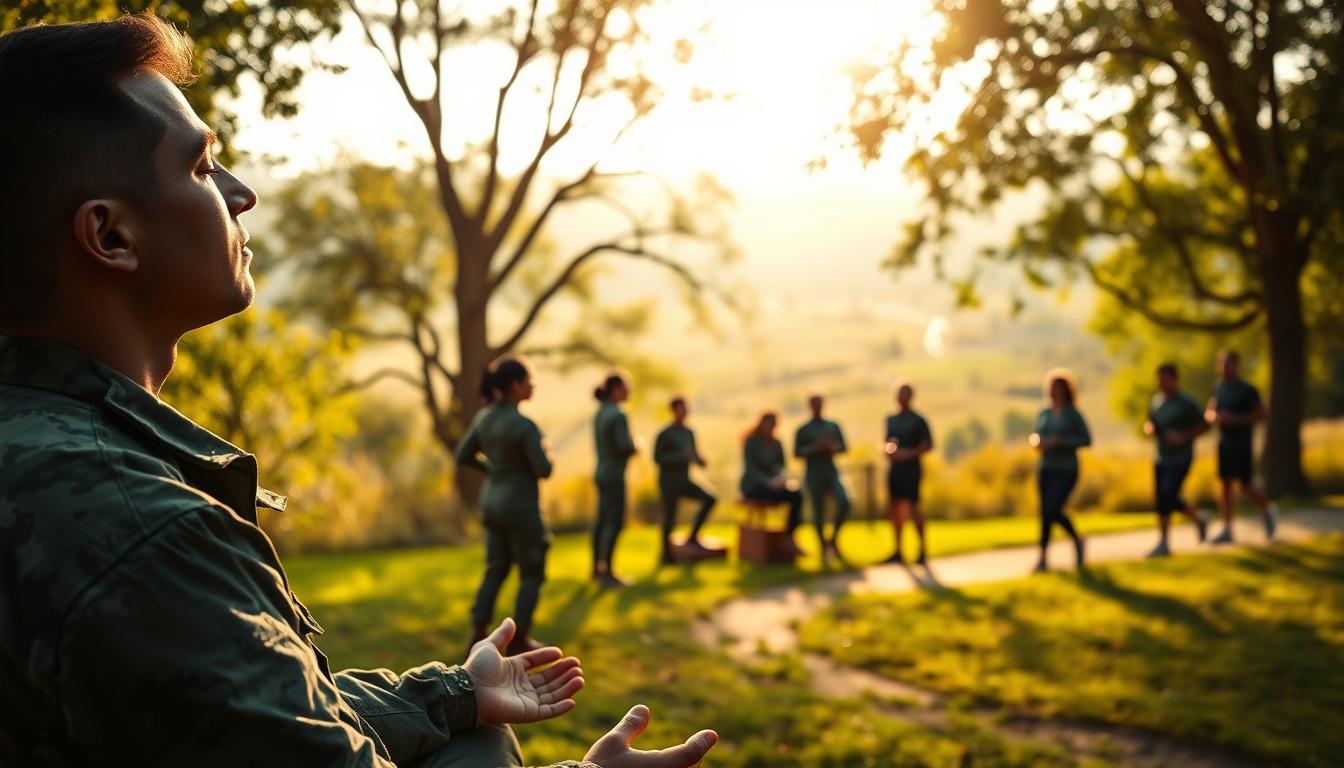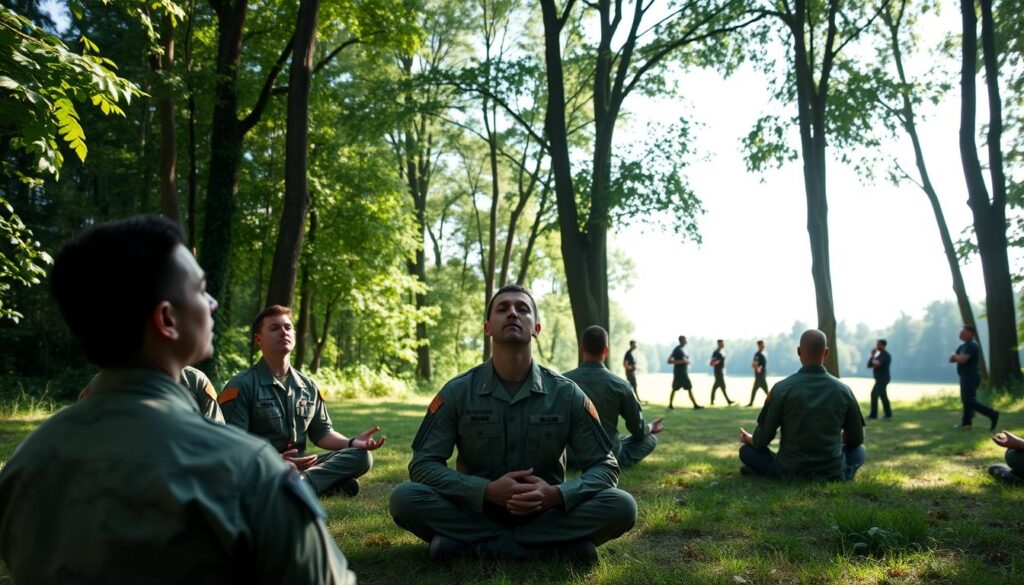Can soldiers reach their best without focusing on their mental health? The answer is yes, with the right mental wellness strategies. The U.S. Army knows this and has started the Holistic Health and Fitness program. It covers five key areas: mental, spiritual, physical, nutritional, and sleep.
This program shows how important mental fitness is, just like physical fitness. Field Manual 7-22 says a Soldier’s mental readiness depends on their character, behavior, and more. For more on this, check out our article on failing the Army weight standard and what you can do next.
Key Takeaways
- The Holistic Health and Fitness initiative is a new approach to training Soldiers.
- Mental fitness is crucial for Soldier readiness and performance.
- The five domains of readiness are interdependent.
- Mental readiness is dependent on character, behavior, resilience, cognitive skill, and social acuity.
- Leadership support is critical for Soldier wellness.
Importance of Mental Fitness in the Army
Building mental resilience is key for soldiers to handle military life’s demands. It helps them perform well, even under pressure. Lt. Col. Shannon Merkle says leaders can boost mental resilience by sharing their own struggles and how they overcame them.
Understanding Mental Resilience
Mental resilience means bouncing back from tough times. It’s vital for soldiers to do their jobs well. Building it means learning from experiences and adapting to tough situations. Experts say it’s not just about dealing with stress but also growing from it.
“Leaders who share their personal struggles and how they overcame them can inspire their units to build their own mental resilience.”
The Role of Mental Fitness in Performance
Mental fitness is crucial for a soldier’s performance. It boosts focus, decision-making, and ability to work under pressure. Regular mental training can improve thinking and reduce stress effects. For more on exercise and mental health, visit this article.
- Improved focus and concentration
- Enhanced decision-making capabilities
- Better stress management
Recognizing Stress and Its Effects
It’s important to know stress and its effects on mental fitness. Soldiers need to spot stress signs and how it affects their work and health. Spotting stress early helps get the right support.
Common stress effects include:
- Decreased concentration and memory
- Increased irritability and mood swings
- Physical symptoms like headaches or fatigue
Techniques for Improving Mental Fitness
Soldiers can use several methods to boost their mental health. Mental fitness is more than just being tough. It’s about knowing your thoughts, feelings, and actions. By using specific practices, soldiers can handle stress better and perform better overall.
Mindfulness Practices and Techniques
Mindfulness means being fully present and aware of the moment. It’s about noticing your thoughts, feelings, and body without judging. Mindfulness meditation is a great way to reduce stress and anxiety. Spending a few minutes each day on mindfulness can improve focus and clarity.
Journaling is another mindfulness practice that works well. Writing down thoughts and feelings helps soldiers understand their mental state. It’s especially helpful after tough missions or training.
Goal Setting for Soldiers
Setting clear goals is key for staying motivated and focused. Soldiers should aim for both short-term and long-term goals that match their personal and professional goals. Breaking down big goals into smaller tasks helps create a path to success.
The SMART criteria is a good way to set goals. It stands for Specific, Measurable, Achievable, Relevant, and Time-bound. Using this framework makes sure goals are clear and reachable.
| SMART Criteria | Description | Example |
|---|---|---|
| Specific | Clearly define the goal | Improve marksmanship skills |
| Measurable | Quantify the goal | Increase shooting accuracy by 20% |
| Achievable | Ensure the goal is realistic | Based on current training schedule |
| Relevant | Align the goal with broader objectives | Enhance combat readiness |
| Time-bound | Set a deadline for achieving the goal | Within the next 6 months |
Coping Mechanisms for High-Pressure Situations
Soldiers often face situations that test their mental strength. It’s important to have ways to manage stress and stay focused. Techniques like deep breathing exercises and positive self-talk can help.
Developing a pre-performance routine is also key. This could include visualization, physical warm-ups, or other rituals to get ready for tough tasks.
By using these techniques, soldiers can improve their mental fitness. This helps them handle high-pressure situations better.
Physical Health’s Impact on Mental Fitness
Keeping your body healthy is key to enhancing mental strength in the military. Studies show that physical health greatly affects mental resilience and performance. This connection is strong.
Being active and eating right are vital for your health. They help your mind stay clear and strong. This means soldiers can handle stress better.
Exercise Routines for Mental Clarity
Exercise is a big help in cultivating resilience in the army. It boosts both physical and mental health. Good exercise for your mind includes:
- Aerobic exercises such as running or cycling
- Strength training to build physical and mental toughness
- Flexibility and balance exercises like yoga or tai chi
These activities lower stress, improve mood, and boost thinking skills. Regular exercise leads to better mental health for soldiers.
Nutritional Guidance for Optimal Performance
Eating right is also crucial for mental health. A balanced diet is essential for a healthy brain. Important nutrients include:
| Nutrient | Benefit | Food Sources |
|---|---|---|
| Omega-3 Fatty Acids | Supports brain health | Salmon, walnuts, chia seeds |
| Antioxidants | Reduces oxidative stress | Berries, leafy greens, nuts |
| Complex Carbohydrates | Provides sustained energy | Whole grains, fruits, vegetables |
Drinking enough water is also important. Dehydration can hurt your thinking and mood. Soldiers need to eat well and stay hydrated for their mental health.
Building a Supportive Community
Creating a supportive community is key for military mental health. It helps soldiers talk openly about their feelings. This reduces stigma and boosts overall well-being.
The Importance of Peer Support
Peer support is vital in a supportive community. Soldiers who share their stories with peers build strong bonds and camaraderie. This is essential for mental health support. The U.S. Army says mental health support is crucial for readiness.
Engaging in Team-Building Activities
Team-building activities are also crucial. They help soldiers build trust and cooperation. This makes them work better together under stress. Team-building exercises help soldiers form stronger relationships, improving their mental health and resilience.
Resources for Mental Health Support
Having access to mental health resources is also key. The military offers counseling services and mental health professionals. Soldiers are encouraged to use these resources to keep their mental health strong and support their peers.
By focusing on peer support, team-building, and mental health resources, the military can foster a culture of resilience and well-being. This helps its personnel thrive.
Continuous Learning and Adaptation
Maintaining mental fitness is a never-ending journey. Soldiers must be ready to change and try new ways. By following Army mental fitness tips, they can boost their mental strength.
Embracing New Approaches
It’s key to stay motivated and focused when faced with tough times. Using visualization, meditation, and journaling can help. These methods can make it easier to handle stress and pressure.
Tracking Progress
Keeping an eye on how you’re doing is important. Setting goals and tracking them can boost confidence. It also helps to grow and adapt to new situations.
By using new strategies and tracking progress, Soldiers can keep their mental fitness high. This improves their performance and resilience in the military.



